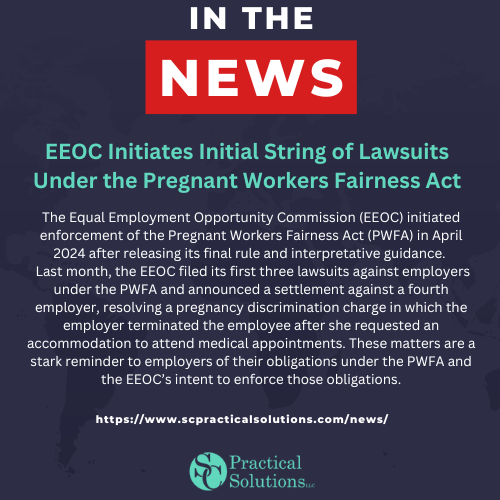 The Equal Employment Opportunity Commission (EEOC) began enforcing the Pregnant Workers Fairness Act (PWFA) after releasing its final rule and guidance in April 2024.
The Equal Employment Opportunity Commission (EEOC) began enforcing the Pregnant Workers Fairness Act (PWFA) after releasing its final rule and guidance in April 2024.
- The EEOC filed its first three lawsuits under the PWFA and settled a fourth case involving pregnancy discrimination.
- Employers are reminded of their obligations under the PWFA, especially regarding accommodations for pregnant employees.
Key Takeaways for Employers:
- Prohibition on Forced Leave: Employers cannot place pregnant employees on leave if a reasonable accommodation is available.
- Interactive Process Requirement: Employers must engage in an interactive process to assess accommodation requests and cannot unreasonably deny or impose accommodations.
- Legal Examples: In one case, the EEOC alleged that an employer placed an employee on leave without engaging in the interactive process, violating the PWFA.
Actions Employers Should Take:
- Review Policies and Training: Ensure all workplace policies and training are updated to comply with the PWFA.
- Train Management and HR: Ensure HR and management are familiar with the PWFA, including the limitations on requesting medical documentation and understanding the EEOC’s guidance on accommodations.
- Understand the PWFA’s Scope: The PWFA is broader than the ADA, making it harder for employers to claim “undue hardship” and does not have a threshold for the severity of the condition.
- Engage in the Interactive Process: Employers must have a transparent process to handle accommodation requests.
- Consider State and Local Laws: Ensure compliance with any additional state or local laws related to pregnancy accommodations.
LEARN MORE
LEARN MORE
LEARN MORE
Posted In: Resource Information
 The Equal Employment Opportunity Commission (EEOC) began enforcing the Pregnant Workers Fairness Act (PWFA) after releasing its final rule and guidance in April 2024.
The Equal Employment Opportunity Commission (EEOC) began enforcing the Pregnant Workers Fairness Act (PWFA) after releasing its final rule and guidance in April 2024.